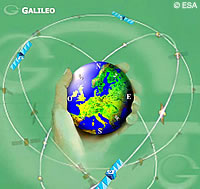Transport Council gives go-ahead for Galileo
The release of 450 million euro of EU funding for the development of the Galileo European satellite navigation system was unanimously approved at a meeting of the EU Transport Council on 26 March. The Council also adopted a regulation establishing the 'joint undertaking' which will manage the project. The decision will unlock crucial funding for the development stage of the project - Europe's answer to the American GPS and Russian Glonass Systems - which had been delayed due to concerns expressed by some EU Member States. Commission Vice-President responsible for transport and energy, Loyola de Palacio, said the 'will' of Europe had been expressed through the political decision to launch the project. 'It's great news which demonstrates the capacity of the European Union to lead an ambitious industrial project,' she said, adding that Galileo 'allows Europe to keep its autonomy, sovereignty, technological capacity and control of its knowledge.' Commission President Romano Prodi said: 'I am firmly convinced that Galileo will be a success.' He said the project is a 'truly 'European' innovation, which will allow the creation of 150,000 new jobs and an income of around 10 billion euro per year. It will encourage competition in the radio-navigation sector which has for years been the monopoly of the Russian and American military authorities.' Ms de Palacio also highlighted the increased choice which Galileo will create, explaining that it will help to avoid 'a monopoly situation, and give everyone the opportunity to choose.' She emphasised, however, that Galileo 'aims to be completely compatible' with GPS, and that together the two systems will be 'more solid and reliable.' The European space agency (ESA) also welcomed the Council's decision, describing it as 'a great step forward for space activities and for Europe, a step that will bring benefits to people all over the world. ESA Director-General Antonio Rodotà said: 'Galileo marks an important step for Space Europe because it is the first time a project has been conducted jointly by the European space agency and the European Union.' ESA is co-funding the Galileo project, and has committed 550 million euro to the system's development. The development phase of Galileo, which will run from 2002 to 2005, will allow researchers to test the technology in orbit before the entire 30-satellite network is put in place. This will be followed by the deployment phase up to 2008, when operation and exploitation of the system is expected to begin. The European Commission has hailed the Galileo project, which will provide a massive boost to the EU aerospace industry, as 'a technological revolution equivalent to that engendered by the mobile telephone.'



